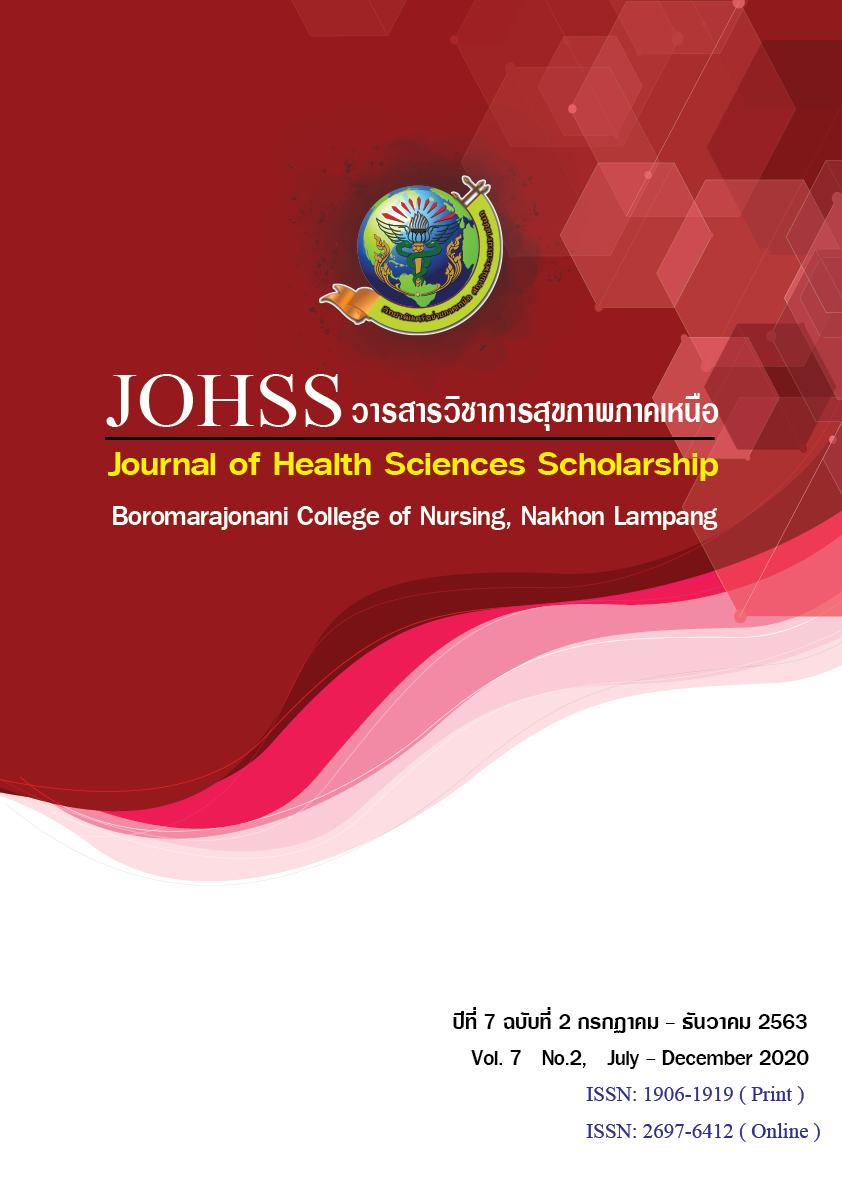การพัฒนาและตรวจสอบความน่าเชื่อถือของเครื่องบันทึกการเคลื่อนไหวรยางค์ส่วนล่างของร่างกาย
คำสำคัญ:
นวัตกรรมเครื่องบันทึกการเคลื่อนไหวรยางค์ส่วนล่างของร่างกาย, การออกกำลังกายรยางค์ส่วนล่างของร่างกายที่ผู้ปฏิบัติออกแรงทำเองทั้งหมด, การวิจัยและพัฒนาบทคัดย่อ
การวิจัยและพัฒนามีวัตถุประสงค์เพื่อพัฒนาและตรวจสอบความน่าเชื่อถือของเครื่องบันทึกการเคลื่อนไหวรยางค์ส่วนล่างของร่างกายสำหรับใช้ในการปฏิบัติกิจกรรมการพยาบาลด้านการตอบสนองความต้องการของผู้ป่วยที่มีแบบแผนสุขภาพด้านกิจกรรมและการออกกำลังกายเบี่ยงเบน มีกระบวนการวิจัยครอบคลุม 3 ระยะคือ ระยะที่ 1 ศึกษาสภาพการณ์การบริการพยาบาลด้านการออกกำลังกายกับผู้ป่วยที่ได้รับบาดเจ็บรยางค์ขาขณะนอนพักรักษาตัวในโรงพยาบาลตติยภูมิ ศึกษาจากนักศึกษาพยาบาล จำนวน 10 คน และ ผู้ป่วย จำนวน 10 คน ใช้การสัมภาษณ์แบบตัวต่อตัวโดยใช้แบบสัมภาษณ์กึ่งโครงสร้าง วิเคราะห์ข้อมูลโดยใช้การวิเคราะห์เนื้อหา ระยะที่ 2 สร้างและพัฒนารูปแบบนวัตกรรมตามวงรอบการพัฒนา 5 ขั้นตอน ดังนี้ ขั้นตอนที่ 1 กําหนดองค์ประกอบ ขั้นตอนที่ 2 ร่างต้นแบบ ขั้นตอนที่ 3 ตรวจสอบและแก้ไขต้นแบบ โดยผู้ทรงคุณวุฒิจํานวน 3 ท่าน ขั้นตอนที่ 4 ทดสอบต้นแบบโดยทดลองใช้ในอาสาสมัครจำนวน 5 คน ขั้นตอนที่ 5 ประเมินและปรับปรุงต้นแบบ ระยะที่ 3 ทดสอบความน่าเชื่อถือของเครื่องบันทึกการเคลื่อนไหวรยางค์ส่วนล่างของร่างกายในอาสาสมัครสุขภาพดี จำนวน 20 คน ด้วยวิธีการทดสอบซ้ำ (test-retest procedure) วิเคราะห์ข้อมูลโดยใช้ Intraclass Correlation Coefficient (ICC3,1) เพื่อหาความเที่ยงและความสอดคล้องของการวัดจำนวนครั้งของการเคลื่อนไหวรยางค์ขาระหว่างอุปกรณ์ที่สร้างขึ้นกับการบันทึกด้วยตนเองของกลุ่มตัวอย่าง
ผลการศึกษา พบว่า ระยะที่ 1 กลุ่มตัวอย่างต้องการมีเครื่องมือที่จะช่วยให้การปฏิบัติกิจกรรมด้านการออกกำลังกายบนเตียงที่สมบูรณ์มีคุณภาพและต่อเนื่องขณะนอนพักรักษาตัวในโรงพยาบาล ระยะที่ 2 ผู้วิจัยพัฒนาเครื่องต้นแบบสำหรับบันทึกการเคลื่อนไหวรยางค์ส่วนล่างของร่างกาย มีหลักการทำงานโดยใช้ Vibration Sensor ตรวจจับความเคลื่อนไหว แปลงพารามิเตอร์การสั่นสะเทือนเข้าไปในสัญญาณไฟฟ้า และส่งสัญญาณเตือนที่ตัวเครื่องต้นแบบที่เชื่อมต่อกับสัญญาณโทรศัพท์เคลื่อนที่โดยแสดงผลผ่านแอพพลิเคชั่นไลน์ ระยะที่ 3 ผลการตรวจสอบคุณภาพพบว่าเครื่องต้นแบบมีความเที่ยงในการวัดซ้ำระหว่างวันที่ 1 และ 2 ของการนับจำนวนครั้งการออกกำลังกายขาบนเตียงช่วงเวลาเช้า-เย็นอยู่ในระดับดีเยี่ยม (ICCs = 0.995 และ 0.996) นอกจากนั้นยังพบว่าการนับจำนวนครั้งโดยเครื่องต้นแบบมีความสอดคล้องกับการนับจำนวนครั้งด้วยตนเองช่วงเวลาเช้า-เย็นทั้งสองวันอยู่ในระดับดีเยี่ยม (ICCs = 0.995, 0.994, 0.996 และ 0.993 ตามลำดับ) เครื่องบันทึกการเคลื่อนไหวรยางค์ส่วนล่างของร่างกายมีความน่าเชื่อถือเพียงพอที่จะนำไปประยุกต์ใช้ในคลินิก
เอกสารอ้างอิง
Chotiban. P., Nawsuwan, K., Nontaput, T., & Rodniam, J. (2013). Innovation of Assisted Models for Practicing Basic Nursing Skills. Princess of Naradhivas University Journal. 5(3), 1-12. (in Thai).
Chuenjit, K. & Ua-kit, N. (2017). The Effect of Leg Exercise Combined with Reflexology on Femoral Venous Blood Flow Velocity in Post Abdominal Surgery Patients. Kuakarun Journal of Nursing, 24(1), 163-177. (in Thai).
Donaghy, S. & Wass, P.J. (1998). Inter-rater reliability of functional assessment in a brain injury programme. Archive of Physical Medicine and Rehabilitation, 79, 1231-1236.
Hanchanlert, Y. (2014). Effectiveness of Education Program on Correct Posture and Daily Exercise in Reducing and Preventing Back Pain in Patients with Chronic Low Back Pain, Kuean Sub-district, Kosumpisai District, Mahasarakam Province. Journal of Health Science, 22(4), 601-608. (in Thai).
Jirojanakul, P. (2013). Nursing Research: Concepts Principle and Practice. (3rd ed.). Bangkok: the Praboromarajchanok Institute for academic Development. (in Thai).
Khamnuan, P., Chuayunan, N. & Deaupakarakul, S. (2018). Efficacy of Clinical Practice Guidelines for Prevention Pressure Injury in Risk Patients, Phayao Hospital. Hua Hin Sook Jai Klai Kangwon Journal, 3(2), 89-101. (in Thai).
Kitisomprayunkun, W., Yotnưangnit, P., & Panyasiwanit, S. (2017). Rehabilitation Medicine Textbook. Bangkok: Chula Print. (in Thai).
Makaluck, B. (2018). Expectation and Perception of Patients regarding to Service Quality, Inpatient Department, Napalai Hospital. Hua Hin Sook Jai Klai Kangwon Journal. 3(2), 19-27. (in Thai).
Markdum, J., Thanasilp, S., & Pudtong, N. (2017). The Effects of a Shoulder Exercise Program Combined with Qigong on Ability to Shoulder Function of Breast Cancer Patients after Mastectomy. Songklanagarind Journal of Nursing, 37(1), 38-52. (in Thai).
Phamornpon, S. (2016). The Role of Nurses in Promoting Early Postoperative Ambulation. Thai Red Cross Nursing Journal, 9(2), 14-23. (in Thai).
Phoodaangau, B., Klankaradi, K., Ketjirachot, R. (2015). Post-Delivery Hospitalisation Experience of Mothers with Pre-Natal Bleeding Caused by Placenta Previa: A Qualitative Study. Thai Journal of Nursing Council, 30(3), 80-97. (in Thai).
Plyyong, S., Hanprasitkam, K. & Manyanon, S. (2018). A Feasibility Study of an Exercise Program on Fatigue of Hospitalized Patients with Acute Myeloid Leukemia undergoing Chemotherapy. Journal of The Royal Thai Army Nurses, 19(1), 127-135. (in Thai).
Pundee, J., Chayaput, P., Chanruangvanich, W., & Wannatoop, T. (2019). Predictors of Functional Restoration in Extremity Injury Patients. Journal of Thailand Nursing and Midwifery Council, 34(4), 48-63. (in Thai).
Rumyakul, P. (2018). Mobile Revolution: A Study of Factors Causing a Step to Mobile Age in Thailand, and Following Impacts. Siam Communication Review, 17(22), 45-53. (in Thai).
Taiwong, A., Anekwit, N., Saraphok, W., Urakeaw, N., Jitsawa, N., Phawpolsong, N., Janthee, B., Phatithanto, M., Rattanapholpan, L., & Makaew, S. (2017). Innovative Set to Promote Arms and Shoulders Exercise after Breast Surgery: From Evidence Based Practice to Innovation. Mahasarakham Hospital Journal, 14(3), 114-124. (in Thai).
Tayakee, K., Siritarungsri, B., & Wipassilapa, S. (2016). Professional Nurses’s Readiness towards International Nursing Service Excellence at a Tertiary Hospital in Bangkok Metropolitan. Journal of The Police Nurses, 8(2), 107-118. (in Thai).
Tammanee, M. (2017). An analysis of nursing documentation of COPD's patient records in the Inpatient Department, Tha Sae hospital, Chumphon Province. Region 11 Medical Journal, 31(1), 131-141. (in Thai).
Thanathornwong, B. & Engsomboon, N. (2017). A Comparative Study of Head and Upper Arm Movement Angle among Srinakharinwirot University Dental Students during the Intelligent Ergonomics Trainer with or without Feedback. Srinakharinwirot University Dental Journal, 10(2), 11-26. (in Thai).
Theerasopon, P., Muangpin, S., Neelasamith, S., Najmuangjun, S., Chattanapanich, A & Hansittiporn, K. (2017). The Effects of Promoting Maternal Mobility and Upright Positions during the First Stage of Labor. Journal of Phrapokklao Nursing College, 28(1), 1-13. (in Thai).
Wongsaree, C. (2015). Clinical Teaching in Adult Nursing Practicum Course for Generation Z Collegian. Journal of Boromarajonani College of Nursing, Bangkok, 31(2), 130-140. (in Thai).
Yimprasert, N., Prasertsong, C., & Khungtumneam, K. (2015). The Development of Nursing Practice Guideline on Behavior Management of Diet and Exercise for Blood Glucose Control of Type II Diabetes. Kasem Bundit Journal, 16(2), 61-81. (in Thai).
ดาวน์โหลด
เผยแพร่แล้ว
ฉบับ
ประเภทบทความ
สัญญาอนุญาต
บทความ ข้อมูล เนื้อหา รูปภาพ ฯลฯ ที่ได้รับการตีพิมพ์ในวารสารวารสารวิชาการสุขภาพภาคเหนือ ถือเป็นลิขสิทธิ์ของวารสารวารสารวิชาการสุขภาพภาคเหนือ หากบุคคลหรือหน่วยงานใดต้องการนำทั้งหมดหรือส่วนหนึ่งส่วนใดไปเผยแพร่ต่อหรือเพื่อกระทำการใดๆ จะต้องได้รับอนุญาตเป็นลายลักอักษรจากวารสารวารสารวิชาการสุขภาพภาคเหนือก่อนเท่านั้น
เนื้อหาและข้อมูลในบทความที่ลงตีพิมพ์ในวารสารวิชาการสุขภาพภาคเหนือถือเป็นข้อคิดเห็นและความรับผิดชอบของผู้เขียนบทความโดยตรงซึ่งกองบรรณาธิการวารสาร ไม่จำเป็นต้องเห็นด้วย หรือร่วมรับผิดชอบใดๆ
อนึ่ง ข้อความและข้อคิดเห็นต่างๆ เป็นของผู้เขียนบทความนั้นๆ ไม่ถือเป็นความเห็นของวารสารฯ และวารสารฯ ไม่จำเป็นต้องเห็นด้วยกับข้อความและข้อคิดเห็นใดๆ ของผู้เขียน วารสารฯ ขอสงวนสิทธิ์ในการพิจารณาตีพิมพ์ตามความเหมาะสม รวมทั้งการตรวจทานแก้ไขหรือขัดเกลาภาษาให้ถูกต้องตามเกณฑ์ที่กำหนด



